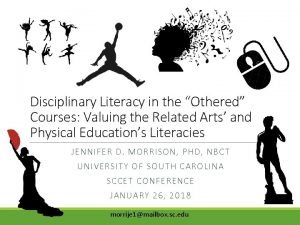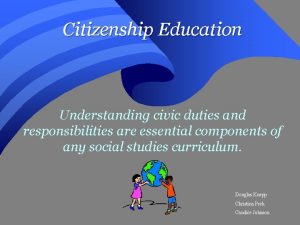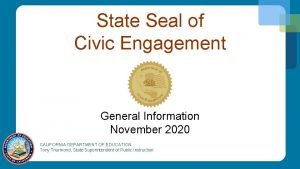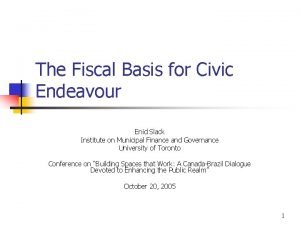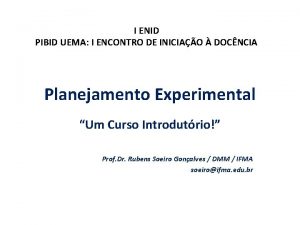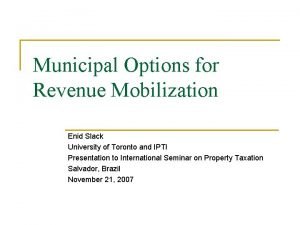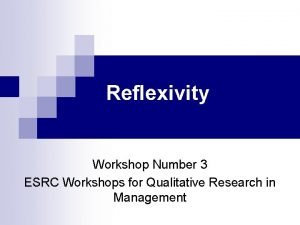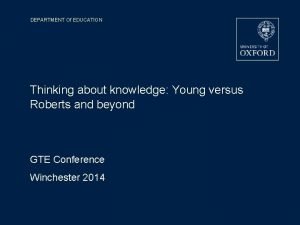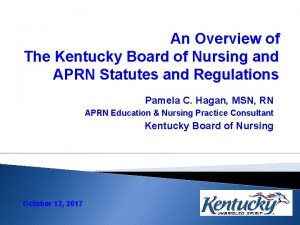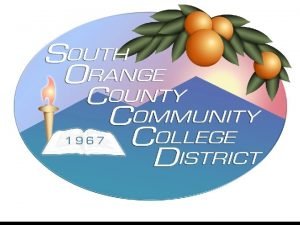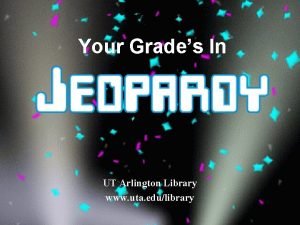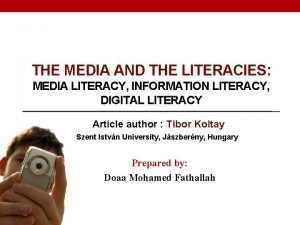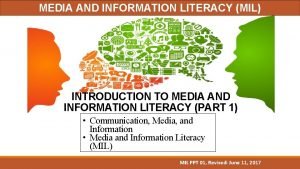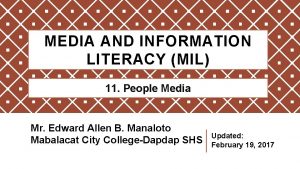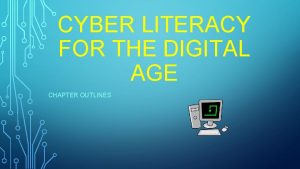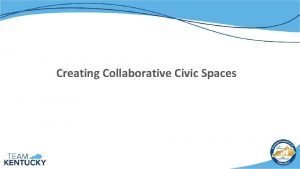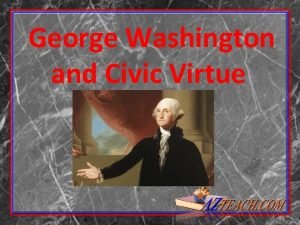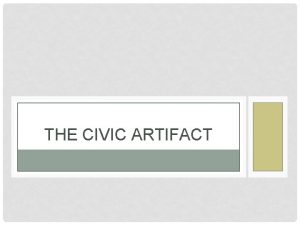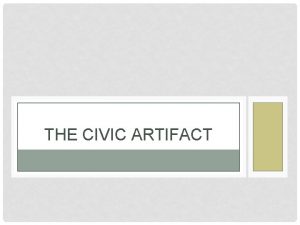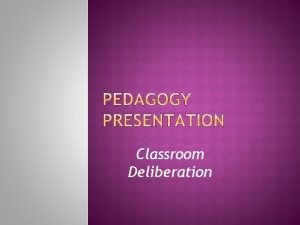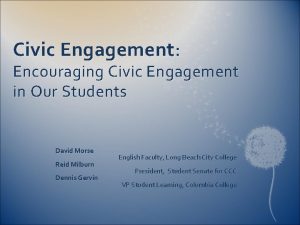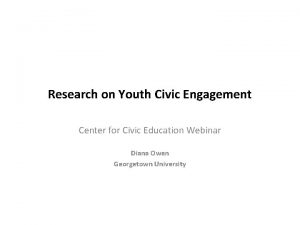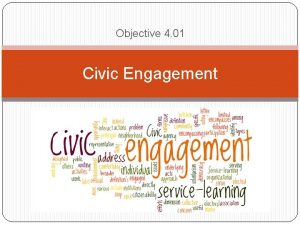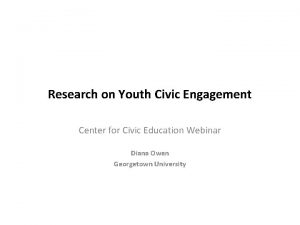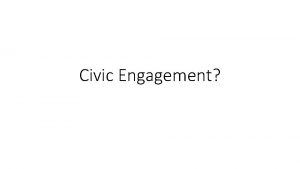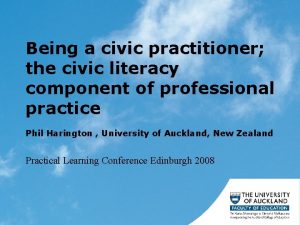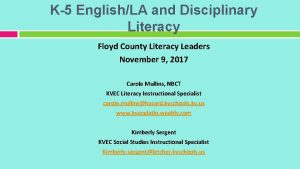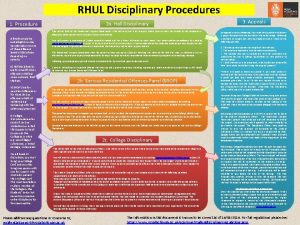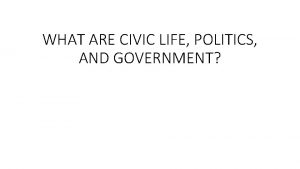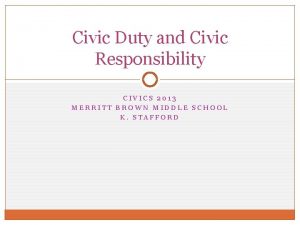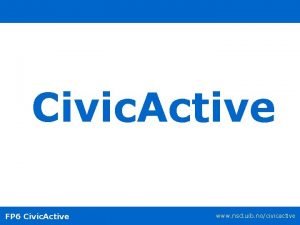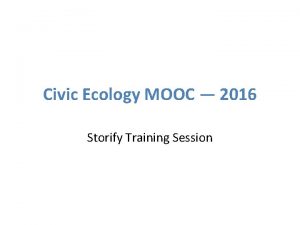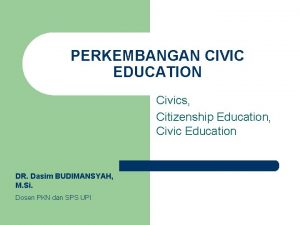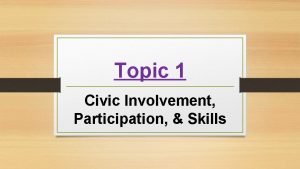DISCIPLINARY LITERACY AND CIVIC ENGAGEMENT Enid M RosarioRamos

























- Slides: 25

DISCIPLINARY LITERACY AND CIVIC ENGAGEMENT Enid M. Rosario-Ramos, Ph. D Assistant Professor Educational Studies March 5, 2019

WHO IS IN THE ROOM? § Elementary § Middle § Secondary 2 Monday, October 25, 2021

AGENDA FOR TODAY § Providing a rationale for the integration of civic engagement into disciplinary literacies and practices § Introduction to Youth Participatory Action Research (YPAR) § Discussion of a complex and enduring problem as an example for discussing integration across disciplines and grade levels § Analysis and modification of lesson plans to address the specific needs of students across disciplines and grade levels 3 Monday, October 25, 2021

STATE OF MICHIGAN COLLEGE AND CAREER READINESS “Career & college-ready students possess the skills necessary to earn a self-sustaining wage and participate in postsecondary opportunities without remediation. This means that they: § Use technology and tools strategically in learning and communicating § Use argument and reasoning to do research, construct arguments, and critique the reasoning of others § Communicate and collaborate effectively with a variety of audiences § Solve problems, construct explanations and design solutions. ” (https: //www. michigan. gov/mde/0, 4615, 7 -140 -28753 ---, 00. html) 4 Monday, October 25, 2021

But… what are the civic engagement and literacy expectations across disciplines? 5 Monday, October 25, 2021

MICHIGAN WORLD LANGUAGE STANDARDS AND BENCHMARKS “Michigan students, like students throughout the United States, are living in and contributing to an increasingly diverse society and interdependent community of nations in the 21 st century. To realize their personal, social, and long-term career goals, individuals need to be able to communicate with others skillfully, appropriately, and effectively. The challenge of contemporary education is to 6 Monday, October 25, 2021

COMMON CORE STATE STANDARDSMATHEMATICS (2010) “Mathematically proficient students can apply the mathematics they know to solve problems arising in everyday life, society, and the workplace” (p. 7). 7 Monday, October 25, 2021

COMMON CORE STATE STANDARDSELA (2010) § “They reflexively demonstrate the cogent reasoning and use of evidence that is essential to both private deliberation and responsible citizenship in a democratic republic. ” § “To be ready for college, workforce training, and life in a technological society, students need the ability to gather, comprehend, evaluate, synthesize, and report on information and ideas, to conduct original research in order to answer questions or solve problems, and to analyze and create a high volume and Monday, October 25, range of print and nonprint texts in extensive 8 2021

A FRAMEWORK FOR K-12 SCIENCE EDUCATION* § “The overarching goal of our framework for K-12 science education is to ensure that by the end of 12 th grade, all students have some appreciation of the beauty and wonder of science; possess sufficient knowledge of science and engineering to engage in public discussions on related issues; are careful consumers of scientific and technological information related to their everyday lives; are able to continue to learn about science outside school; and have the skills to enter careers of their choice, including (but not limited to) careers in science, engineering, and technology” (p. 1). § “Although the intrinsic beauty of science and a fascination with how the world works have driven exploration and discovery for centuries, many of the challenges that face humanity now and in the future—related, for example, to the environment, energy, and health—require social, political, and economic solutions that must be informed deeply by knowledge of the underlying science and engineering. ” (p. 7) *National of Sciences (2012) Monday, Academy October 25, 9 2021

PRACTICES FOR K-12 SCIENCE CLASSROOMS 1. Asking questions (for science) and defining problems (for engineering) 2. Developing and using models 3. Planning and carrying out investigations 4. Analyzing and interpreting data 5. Using mathematics and computational thinking 6. Constructing explanations (for science) and designing solutions (for engineering) 7. Engaging in argument from evidence 8. Obtaining, evaluating, and communicating information 10 Monday, October 25, 2021

THE COLLEGE, CAREER, AND CIVIC LIFE (C 3) FRAMEWORK FOR SOCIAL STUDIES STATE STANDARDS* § Advocates of citizenship education cross the political spectrum, but they are bound by a common belief that our democratic republic will not sustain unless students are aware of their changing cultural and physical environments; know the past; read, write, and think deeply; and act in ways that promote the common good (p. 5). § Now more than ever, students need the intellectual power to recognize societal problems; ask good questions and develop robust investigations into them; consider possible solutions and consequences; separate evidence -based claims from parochial opinions; and communicate and act upon what they learn (p. 6). *National Council for the Social Studies (2013) 11 Monday, October 25, 2021

THE COLLEGE, CAREER, AND CIVIC LIFE (C 3) FRAMEWORK FOR SOCIAL STUDIES STATE STANDARDS This involves: § developing questions and planning inquiries; § applying disciplinary concepts and tools; § evaluating sources and using evidence; and § communicating conclusions and taking informed action. 12 Monday, October 25, 2021

SOCIAL JUSTICE AND DEMOCRATIC PARTICIPATION Our students live in a society that is: 13 § increasingly diverse and interdependent, and § grounded in responsible and informed democratic participation. This society requires students who are able to: § identify and understand complex problems, § collaboratively develop well-researched and supported solutions, and § communicate effectively to multiple stakeholders. Monday, October 25, 2021

(Inter)Disciplinary knowledge and practices Successful democratic participation Literacy skills and practices 14 Monday, October 25, 2021 Civic engagement skills and dispositions

YOUTH PARTICIPATORY ACTION RESEARCH § YPAR merges civic engagement with tenets of critical pedagogy by engaging students in researching and providing solutions to authentic problems (Cammarota & Romero, 2011). § a collective investigation of collectively defined research questions § a reliance on local community knowledge to examine issues that are most relevant to that community § a systematic analysis of disparate relations of power marked by intersections between issues of race, gender, class, age, sexual preference, ability, and other markers of difference § a commitment to making transformative action and social change a product of the investigation

YPAR RESEARCH PROCESS Identify an authentic problem Evaluate the action, assess its efficacy, and reexamine the state of the problem Implement the collective plan of action Research the problem Develop a collective plan to address the problem Duncan-Andrade & Morrell, 2008

DISCIPLINARY LITERACIES § “…although the disciplines share certain commonalities in their use of academic language (Snow, 1987), they also engage in unique practices. That is, there are differences in how the disciplines create, disseminate, and evaluate knowledge, and these differences are instantiated in their use of language” (Shanahan & Shanahan, 2008). § …disciplinary literacy as the knowledge of and skill with the specialized linguistic codes, technical vocabularies, and discourse practices that draw from and reproduce the epistemic understandings and routine practices of a discipline…to teach disciplinary literacy, teachers need to involve learners in inquiry that allows the learner to gain insight into how questions are asked and examined and how conclusions are drawn, supported, communicated, contested, and defended. (Moje, 2015)

NOW, LET’S APPLY SOME OF THESE IDEAS

ENVIRONMENTAL JUSTICE: A COMPLEX AND ENDURING PROBLEM “Environmental justice is the fair treatment and meaningful involvement of all people regardless of race, color, national origin, or income, with respect to the development, implementation, and enforcement of environmental laws, regulations, and policies. EPA has this goal for all communities and persons across this nation. It will be achieved when everyone enjoys: 19 § the same degree of protection from environmental and health hazards, and § equal access to the decision-making process to have Monday, October 25, a healthy environment in which to live, learn, and 2021

ENVIRONMENTAL JUSTICE: A COMPLEX AND ENDURING PROBLEM Mathematics Social sciences Language and Literacy Science Environmental Justice From K-12

ENVIRONMENTAL JUSTICE: A COMPLEX AND ENDURING PROBLEM § Global issue with local implications: § § Air quality Access to clean water Noise pollution Pollution related health issues Also an issue that highlights issues of diversity and equity as the problems are not equally distributed.

ENVIRONMENTAL JUSTICE: A COMPLEX AND ENDURING PROBLEM 22 Monday, October 25, 2021

TASK § Imagine that your school has decided to engage in a collective study of environmental justice. § Look at the provided lesson plan and reflect on: § The disciplinary content and skills required for the work in your lesson § The demands of the texts in the lesson § The required literacy skills (reading, writing, speaking, and listening) § Based on your knowledge of your students, school community, and disciplines, decide how you would adapt the: § § Learning goals and scope of the lesson Disciplinary content that will be covered Texts and literacy-related activities and scaffolds Learning activities

REFLECTION: § What is the value of civic engagement education in your discipline(s) and grade level? § What are the content (knowledge and skills) demands of such work? § What about the literacy demands? § Can you think of other examples of ways to integrate disciplinary literacies and civic engagement? 24 Monday, October 25, 2021

Thank you! erosario@umich. edu 25 Monday, October 25, 2021
 Difference between civic duties and civic responsibilities
Difference between civic duties and civic responsibilities Disciplinary literacy in physical education
Disciplinary literacy in physical education Civic citizenship
Civic citizenship California state seal of civic engagement
California state seal of civic engagement Civic engagement meaning
Civic engagement meaning Enid slack
Enid slack Enid uema
Enid uema Enid slack
Enid slack Reflexivity definition
Reflexivity definition Disciplinary record higher pe
Disciplinary record higher pe Disciplinary knowledge
Disciplinary knowledge Powerful disciplinary knowledge
Powerful disciplinary knowledge Capa-cs collaborative agreement
Capa-cs collaborative agreement Frisk documentation model
Frisk documentation model Ut arlington library
Ut arlington library Media literacy and information literacy similarities
Media literacy and information literacy similarities M i l subject
M i l subject Who do you think are people media
Who do you think are people media Cyber literacy for the digital age
Cyber literacy for the digital age Civic mirror
Civic mirror Civic space collaborative
Civic space collaborative Civic mirror hidden agendas
Civic mirror hidden agendas How did george washington show civic virtue
How did george washington show civic virtue Brampton civic hospital pharmacy
Brampton civic hospital pharmacy What is a civic artifact
What is a civic artifact What is a civic artifact
What is a civic artifact

